More work needs to be done for disability rights after 30 years of ADA, bill author, former senator Tom Harkin says
DES MOINES – Former U.S. Sen. Tom Harkin can still recall the day his older brother Frank Harkin was taken away from their family home in Cumming.
Frank Harkin lost his hearing at the age of 5, Tom Harkin said, and at that time, the only place where he could get an education was more than two hours away in Council Bluffs at the Iowa School for the Deaf. Tom Harkin said state officials came one day and took his brother away from his family, community and all his friends so he could go to the school.
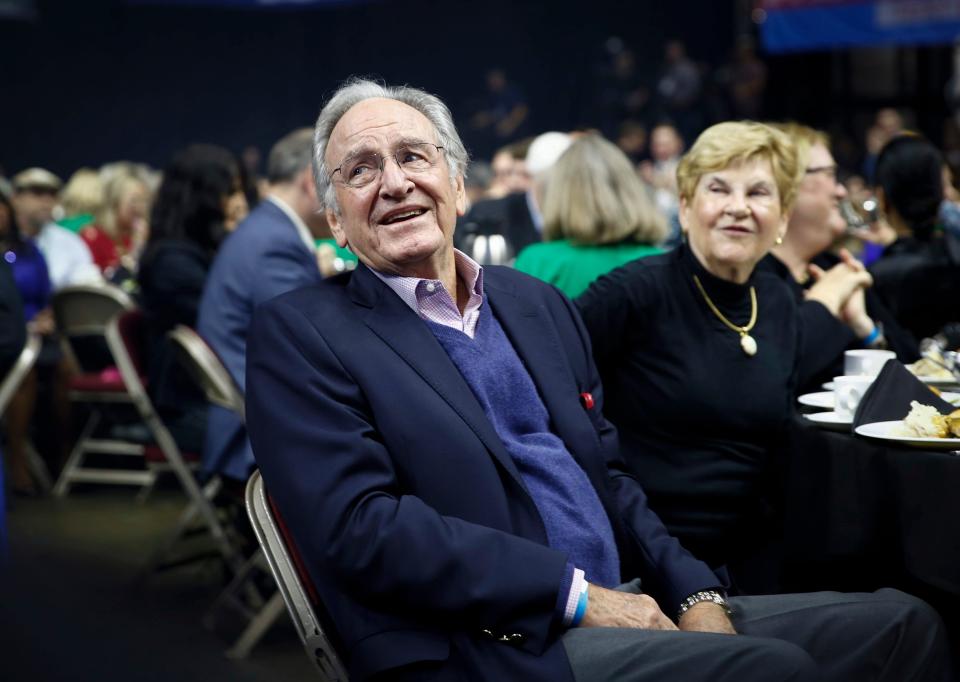
“That is very traumatic," Tom Harkin said. “And in those days, they always referred to it as the ‘Iowa School for the Deaf and Dumb.'
“I remember my brother one time told me, ‘I may be deaf, but I'm not dumb.’”
Frank Harkin would become the inspiration for one of Sen. Harkin’s proudest achievements — the Americans with Disabilities Act of 1990. As the Senate was about to adopt the groundbreaking ADA, Harkin, the author and chief sponsor, began his speech from the Senate floor in American sign language, becoming the first senator to do so.
“I wanted to do that as a special way of thanking a very special person in my life who taught me at a very young age that people with disabilities could do anything they set their minds to do,” Harkin said after his introduction in ASL.
“In sign language, I just wanted to say to my brother Frank that today was my proudest day in 16 years in Congress. That today, Congress opens the doors to all Americans with disabilities. That today, we say no to fear, that we say no to ignorance, and that we say no to prejudice.”
Since the ADA was signed into law 30 years ago, on July 26, 1990, the country has made significant changes in the way it treats people with disabilities.
Harkin said the biggest milestone has been changing Americans' attitudes about people with disabilities, treating them with dignity as opposed to pity and condescension.
“As I've often said in the past, the biggest barriers for people with disabilities are not the physical barriers they have, but the attitudinal barriers,” Harkin said. “The world before was a world of isolation for people with disabilities. It was a life of hurtful, demeaning language.
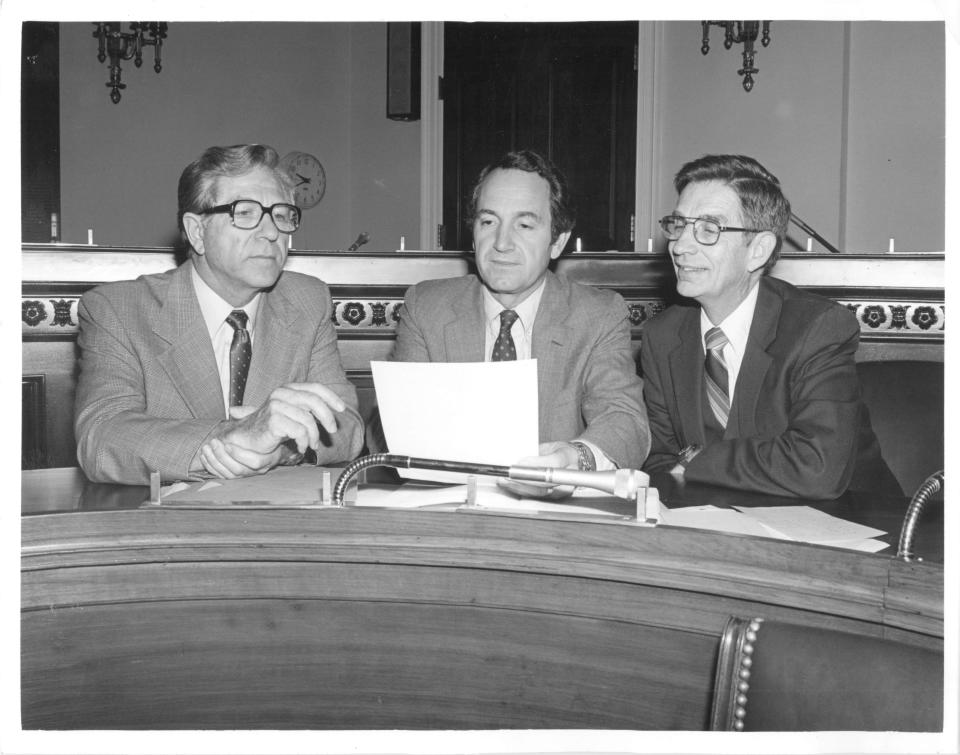
Another milestone, related to changing attitudes, was integrating people with disabilities into the public school system. As part of the Individuals with Disabilities Education Act of 1990, which Harkin also sponsored, students with disabilities were to be accommodated at their neighborhood schools. Unlike Harkin’s brother Frank, children with disabilities no longer had to leave their families and homes to receive an education.
Probably the most visible area of improvement has been changes to what he calls the “built environment,” which includes curb cuts, ramps, automatic door openers and accessible bathrooms. Additionally, telecommunications are now required to accommodate the deaf and blind with text-to-voice and voice-to-text, he said.
But in the areas of economic self-sufficiency and equal employment, Harkin says there is still a lot of work to be done.
“We’ve barely moved the needle,” he said. "The unemployment rate for adults with disabilities today is about the same as it was 30 years ago."
Roadblocks to equal opportunity employment
When Frank Harkin was about to graduate from the Iowa School for the Deaf, faculty told him he could become one of three things — a baker, a printer’s assistant or a shoe cobbler.
“He became a very good baker, but that's not what he wanted to do,” Tom Harkin said. With ADA legislation, the former senator wanted to open doors to all Americans with disabilities to find a job that they enjoyed.
According to the Bureau for Labor Statistics, the labor force participation rate for people with disabilities has hovered around 20% for the last 11 years. That's compared to nearly 70% for people without disabilities.
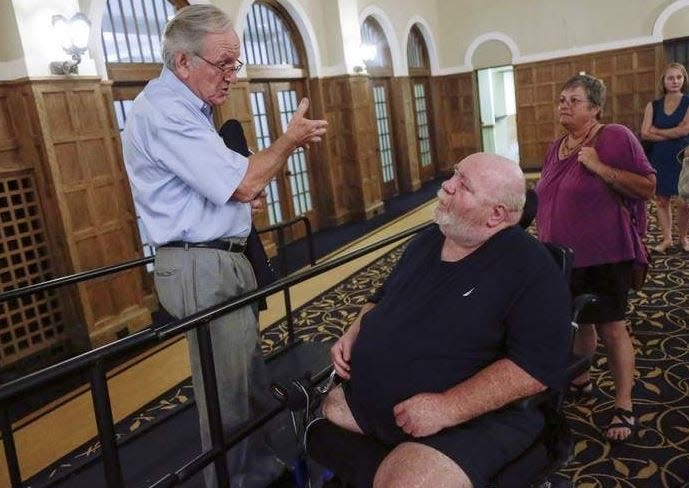
The main cause of the discrepancy, Tom Harkin said, was a trio of Supreme Court decisions made in 1999, known as the “Sutton Trilogy,” that severely limited the definition of the word “disability.”
“That put on hold what we were trying to do in terms of getting more employment opportunities,” Harkin said.
The decisions confused both employers and people with disabilities as to what their rights and responsibilities were under the ADA. Because fewer people qualified as having a disability under the court’s new definition, fewer people were eligible to file a discrimination claim against their employer under the ADA.
The 2008 ADA Amendments Act overturned the court’s decisions and allowed for a broader definition of the word “disability.” But the damage was already done, Harkin said. Rather than having 30 years to make progress in the realm of equal employment opportunity for people with disabilities, the country has had only 11 years.
“That held us up for 19 years,” he said.
Moving toward the ADA's goals
Since the ADA Amendments Act, Harkin says employer reluctance, a lack of outreach from human resource officers and some hesitation from people with disabilities has hindered progress on employment. Harkin said he has focused all of his disability advocacy efforts on employment since retiring in 2015.
"There is a company in central Iowa that I think is showing the way on this, and that's Hy-Vee," Harkin said. "Hy-Vee does a great job of instilling, from the corporate level down to the store level, the requirement that they hire people with disabilities."
Harkin said Hy-Vee has modified its training program to be more inclusive of those with disabilities, and they give people with disabilities opportunities to move beyond bagging groceries.
Until recently, Robert Fisher worked at Hy-Vee in Waukee as a stocker. He has quadriplegic cerebral palsy and type 1 diabetes and has used a wheelchair all his life. He said he was treated well by Hy-Vee customers, fellow employees and management during his time as a stocker.
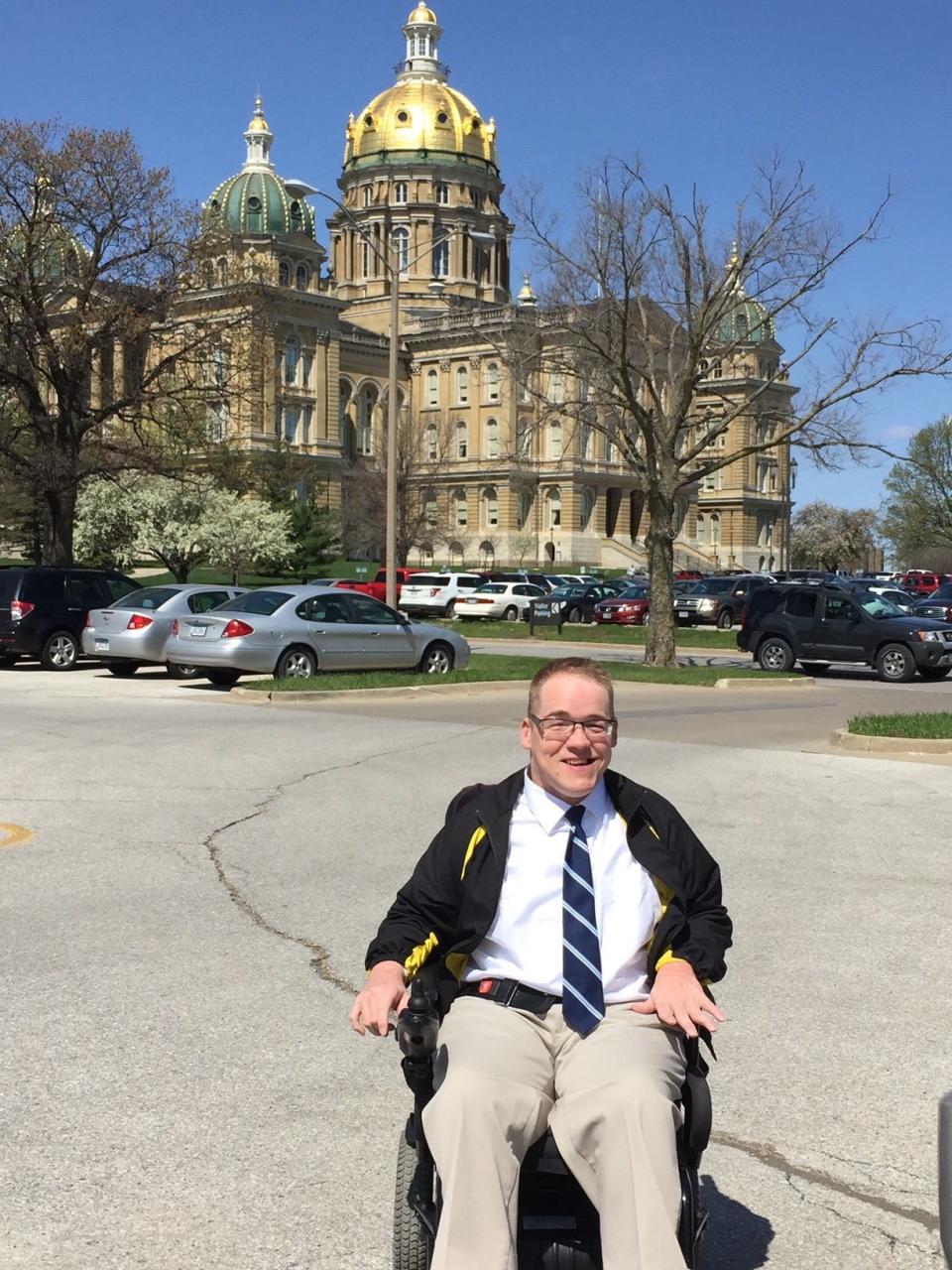
"Unfortunately, I am out of work right now because of COVID-19," said Fisher, who lives with his parents in Adel. "My mom does not want me to work right now."
Fisher, who is also a member of the Iowa Developmental Disabilities Council, has worked with the city of Adel to make downtown streets more accessible to people who use mobility devices.
Fisher said he noticed that there weren’t very many people using walkers or wheelchairs downtown, which led him to realize there were no curb cuts or signal buttons to help navigate the crosswalks.
Brady Werger, another member of the Iowa Developmental Disabilities Council, said he wanted to use his voice to advocate for others with disabilities and help them find the resources and services they need.
The 28-year-old said he feels that people with disabilities are sometimes treated differently and that their disability goes unnoticed or is ignored by others.

“I try to advocate on their behalf and remind people, ‘If your disability is being ignored, don't give up on yourself, keep advocating for yourself.’”
When he was moving out of a Glenwood residential facility and into the community, Werger said he had to stand up for himself and insist that he was ready to live independently.
“A lot of problems that I ran into with my guardians and staff was that they said, ‘Oh, you're not ready. You're going to move out and fail,’” he said. “That’s when I advocated for myself and stepped up and said, ‘Don't say it like that. You don't know somebody is gonna fail until they try.’”
Frank Harkin inspired change
Frank Harkin died in 2000 from congestive heart failure and complications of prostate cancer. But he inspired landmark legislation that now allows young Americans with disabilities to grow up without being excluded from society.
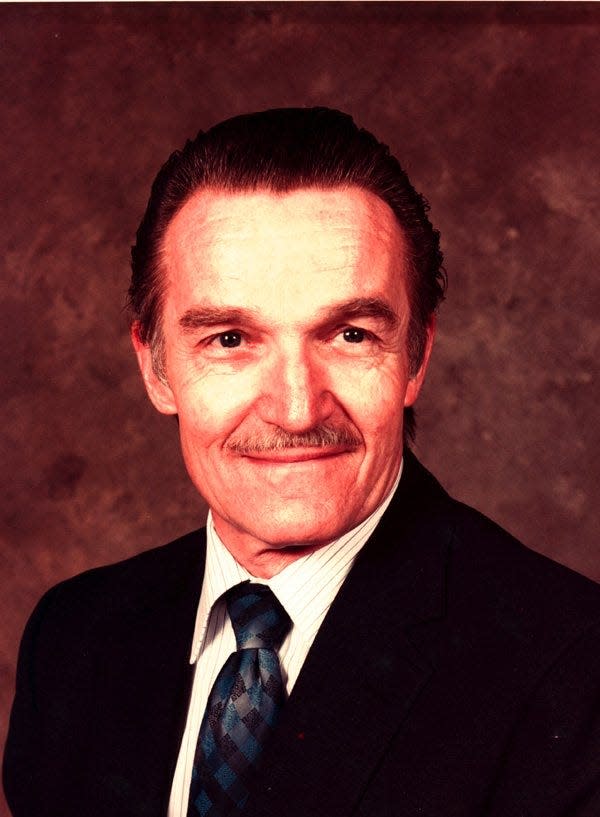
Instead, they are participating in all kinds of activities like sports and politics that, 30 years ago, they wouldn't have been able to do, Tom Harkin said.
"The younger generation who have grown up under ADA, they don't take a backseat," he said. "They're just not going to accept the old way of being isolated and hidden. They want to be included."
Follow the Register on Facebook and Twitter for more news. Maya Miller can be contacted at mmiller4@dmreg.com or on Twitter @mmillerDSM.
Your subscription makes work like this possible. Get exclusive subscriber content and more at DesMoinesRegister.com/Deal.
This article originally appeared on Des Moines Register: Tom Harkin says employment still an issue on 30th anniversary of ADA

